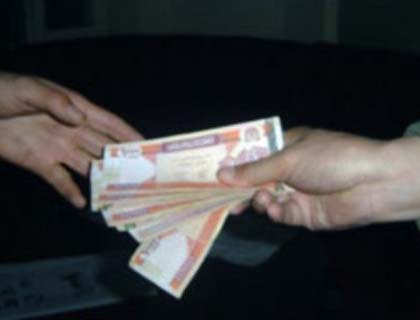The sorry tale of unbridled and pervasive corruption throughout Afghanistan's state agencies is now a renowned story leaving an overwhelming majority of Afghans and international observers and partners of Afghan government disillusioned. What was the nail in this coffin of confidence was the bizarre quip by President Karzai announcing his consent to acts of graft, corruption, embezzlement and bribery in his government as long as the black proceeds are invested inside Afghanistan and are not moved out of the country to Dubai and elsewhere! This indeed sad statement by the president, although intended to be a lighthearted witticism by him, provides us all with a glimpse into the thought processes of our president and reveals complete lack of strong will on the part of the government's leadership to fight against the menace of corruption and the culture of impunity.
The chief of the Independent Directorate of Anti-Corruption has on numerous occasions and in many interviews complained about and criticized the office of Attorney General and other government agencies for lack of cooperation and, in some cases, being hand in glove with corrupt officials.
Corruption in Afghanistan's state agencies and institutions itself is a very complex and multi-faceted phenomenon. The ongoing fight against corruption, while producing results in limiting the extent of petty and small-scale bribery in some institutions that directly deal with clients, has not been successful in curbing the tide of massive corruption within the higher echelons of government leadership.
The testimonies of the chief of the Anti-corruption Directorate in this regard throw light on the depth and extent of the problem. Graft, embezzlement of public money, forgery, bribery, abuse and misuse of power, pervasive rent-seeking behavior, unauthorized and illegal grant of lucrative contracts to cronies and political allies, land grab and misappropriation of government land are all only some of the manifestations of corruption that has thrown Afghanistan into a bottomless pit of decay and destruction.
From President Karzai to the chief of the anti-corruption directorate all the way to the individual directors in each ministry tasked with internal inspection and prevention of malpractice know and understand it all too well that, unfortunately, there is an appalling lack of genuine will to fight corruption. This persistent inaction and the tacit blind eye turned on the large-scale corruption raging in the corridors of power in Afghanistan's both bureaucracy and its political leadership.
Abuse of power and usurp of public resources and money, unfortunately, continues to be pervasive. The situation in the country's border ports and custom houses is grim. There is a barrage of gloomy news coming out of the country's border ports.
Embezzlement and outright theft to the tune of billions of Afghanis happens in the country's border ports and custom houses. Nepotism and cronyism are routine practice with the charge of many revenue-generating departments and offices routinely given to cronies and influential allies in return for a fixed monthly or weekly sum.
These revenue-generating departments, in effect, change hands year after year and every occupant tries his best to extract the maximum amount of proceeds in illegal income. Land-grab is another peculiar form of administrative corruption.
Many important central ministries indulge in outright land-grab under the name of re-possessing the lands that were once owned by the, in the 1970s and 1960s. In many cases, when the courts and the country's judicial system strikes down the bid of these central ministries to re-possess the lands, these agencies do not heed the court's rulings and continue what amounts to outright land-grab. The victims in these cases are common people who, in many cases, possess valid ownership deeds.
The problem of corruption in Afghanistan is a deep-seated phenomenon that takes on political, judicial, social, cultural and even economic underpinnings that sustain it and have rendered ineffective the struggle against it. Chief among them is the political atmosphere in Afghanistan and the inability and unwillingness of the country's political leadership to take radical and determined action.
President Hamid Karzai, as the country's president and the chief executive, unfortunately, has had a poor track record in fighting corruption and reducing this burden. Rather than an impartial and determined approach in fighting corruption and refraining from turning a blind eye either out of weakness or political considerations, the president as the country's chief executive and the de facto monarch of the country has indirectly contributed to the menace of corruption.
The problem of corruption in the country is getting in the way of the state performing and carrying out some of its most essential duties and responsibilities. Pervasive corruption contributes to the ongoing erosion of the credibility and legitimacy of the state and government in the eyes of the public in Afghanistan.
It also discourages private investment and makes it more difficult for the private investors to undertake and finance large-scale projects. Massive corruption has also been hampering the process of development and is a major reason for the failure of the government to promote 'good governance' across the country as an over-arching goal of the state in Afghanistan and its major international partners. Widespread corruption is also contributing indirectly to political instability and prolongs the crisis situation across the country.
The rule of law and enforcement of applicable laws are the first and the strongest bulwarks against the menace of corruption. A strong and impartial judiciary with courts that can uphold the rule of law and protect the greatest good of the public is desperately needed in today's Afghanistan.
Without an effective and impartial judicial system, it is impossible to check and arrest the cancerous growth of corruption. Strengthening the judicial system in Afghanistan of today is an important imperative that goes hand in hand with the goal of stabilizing Afghanistan.

